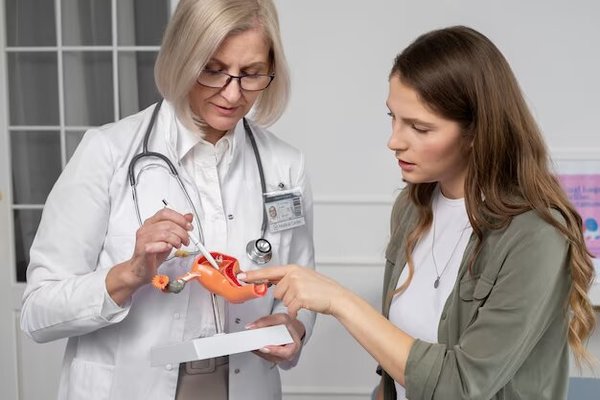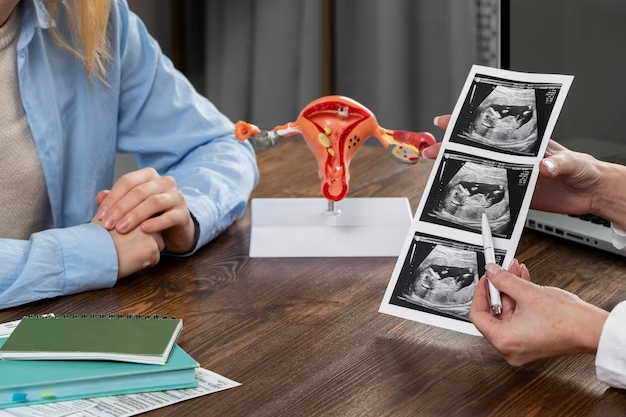
Why regular check-ups with a gynecologist are important
As women, it is crucial for us to prioritize our reproductive health. One of the most effective ways to do this is by regularly visiting a gynecologist. A gynecologist is a specialized doctor who focuses on women's reproductive health, including the health of the uterus, ovaries, and breasts. In this article, we will explore the importance of regular check-ups with a gynecologist and how they empower us to take charge of our reproductive health.
The role of a gynecologist in women's reproductive health

A gynecologist plays a vital role in women's reproductive health. They provide preventive care, diagnose and treat various reproductive health issues, and educate women about their bodies. Regular visits to a gynecologist allow them to monitor our reproductive health, detect any abnormalities or potential problems early on, and provide appropriate interventions. They can also address concerns related to sexual health, contraception, and menopause. By establishing a trusted relationship with a gynecologist, we can ensure that we are receiving the best possible care for our reproductive health needs.
Common misconceptions about gynecological check-ups
There are several misconceptions surrounding gynecological check-ups that can prevent women from seeking the care they need. One common misconception is that gynecological check-ups are only necessary when experiencing symptoms or issues. However, regular check-ups are essential for preventive care and early detection of potential problems, even if we feel healthy. Another misconception is that gynecological exams are painful or embarrassing. While these exams may cause some discomfort, they are conducted in a professional and sensitive manner to ensure our comfort and well-being. It is important to debunk these misconceptions and understand that gynecological check-ups are a crucial part of maintaining our reproductive health.
Benefits of regular gynecological check-ups
Regular gynecological check-ups offer numerous benefits for our reproductive health. Firstly, they allow for early detection and treatment of reproductive health conditions such as cervical cancer, ovarian cysts, or sexually transmitted infections (STIs). Early detection often leads to more successful treatment outcomes. Secondly, gynecologists provide guidance on contraception methods, helping us make informed decisions about our sexual health and family planning. They can also offer advice on fertility and assist with any concerns related to pregnancy or childbirth. Regular check-ups also provide an opportunity for gynecologists to address any emotional or psychological issues that may arise, as our reproductive health is closely linked to our overall well-being.
What to expect during a gynecological check-up
Understanding what to expect during a gynecological check-up can help alleviate any anxiety or uncertainty we may have. Typically, a check-up begins with a discussion about our medical history, current symptoms, and any concerns we may have. The gynecologist will then perform a physical examination, which may include a breast exam, pelvic exam, and a Pap smear to screen for cervical cancer. They may also recommend additional tests based on our age, medical history, or specific concerns. It is important to communicate openly with our gynecologist and ask any questions we may have during the check-up. They are there to provide guidance and support, ensuring that we receive the best possible care for our reproductive health.
Understanding the different types of gynecological exams
Gynecological exams can vary depending on our age, medical history, and specific needs. It is important to understand the different types of exams and when they are recommended. For younger women, a gynecological check-up may focus on education about sexual health, contraception, and prevention of STIs. As we get older, the focus may shift towards screening for cervical cancer, breast health, and menopause-related issues. Regular mammograms, bone density tests, and hormone level checks may be recommended as we enter different stages of life. By understanding the different types of gynecological exams, we can be proactive in seeking the appropriate care and screenings for our age and reproductive health needs.
Age-specific recommendations for gynecological check-ups
The frequency and specific recommendations for gynecological check-ups can vary based on our age. In general, it is recommended to start regular gynecological check-ups in our late teens or early twenties. During our twenties and thirties, annual check-ups are usually recommended, including Pap smears every three years to screen for cervical cancer. As we reach our forties and beyond, the frequency of check-ups may decrease, but regular screenings for breast cancer and other age-specific concerns become more important. It is essential to follow the age-specific recommendations provided by our gynecologist to ensure that we are receiving the necessary care and screenings for our reproductive health at each stage of life.
Addressing common concerns and questions about gynecological check-ups
Many women have common concerns and questions when it comes to gynecological check-ups. Some may feel embarrassed or uncomfortable discussing personal matters related to their reproductive health. However, it is important to remember that gynecologists are professionals who are trained to provide care in a sensitive and non-judgmental manner. They have heard and seen it all, and their primary goal is to ensure our well-being. If we have any concerns or questions, it is crucial to voice them during our check-ups. Our gynecologist can provide the information and support we need to feel empowered and informed about our reproductive health.
When to see a gynecologist outside of regular check-ups
While regular check-ups are important, there may be times when we need to see a gynecologist outside of our scheduled appointments. It is essential to be aware of the signs and symptoms that may warrant an immediate visit to a gynecologist. These include abnormal vaginal bleeding, severe pelvic pain, persistent itching or discomfort, unusual discharge, or any concerns related to sexual health. Additionally, if we experience any changes in our breasts, such as lumps or changes in size or shape, it is important to consult a gynecologist. By being proactive and seeking medical attention when needed, we can ensure that any potential issues are addressed promptly, enhancing our overall reproductive health.
Conclusion: Empowering women to prioritize their reproductive health
Regular check-ups with a gynecologist are a crucial aspect of maintaining our reproductive health. By prioritizing these visits, we can take charge of our own well-being and ensure that any potential issues are detected and addressed early on. Gynecologists play a significant role in providing preventive care, diagnosing and treating reproductive health conditions, and offering guidance on sexual health and family planning. It is important to debunk misconceptions and address any concerns we may have about gynecological check-ups. By doing so, we empower ourselves to make informed decisions about our reproductive health, leading to a healthier and more fulfilling life. Let us prioritize our reproductive health by scheduling regular check-ups with a gynecologist and taking charge of our well-being.
CTA: Schedule an appointment with a gynecologist today to take charge of your reproductive health. Don't wait until you have symptoms or concerns – prevention and early detection are key to maintaining your well-being. Make your reproductive health a priority and book your check-up now.

Leave Comment Below
0 Comment(s)